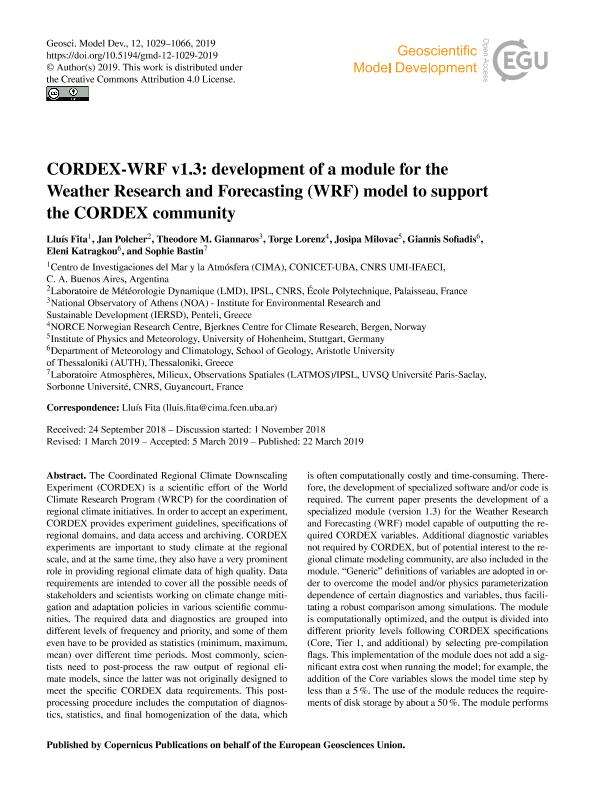Mostrar el registro sencillo del ítem
dc.contributor.author
Fita Borrell, Lluís

dc.contributor.author
Polcher, Jan

dc.contributor.author
Giannaros, Theodore M.
dc.contributor.author
Lorenz, Torge
dc.contributor.author
Milovac, Josipa
dc.contributor.author
Sofiadis, Giannis
dc.contributor.author
Katragkou, Eleni
dc.contributor.author
Bastin, Sophie
dc.date.available
2020-12-28T18:51:46Z
dc.date.issued
2019-03
dc.identifier.citation
Fita Borrell, Lluís; Polcher, Jan; Giannaros, Theodore M.; Lorenz, Torge; Milovac, Josipa; et al.; CORDEX-WRF v1.3: Development of a module for the Weather Research and Forecasting (WRF) model to support the CORDEX community; Copernicus Publications; Geoscientific Model Development; 12; 3; 3-2019; 1029-1066
dc.identifier.issn
1991-9603
dc.identifier.uri
http://hdl.handle.net/11336/121253
dc.description.abstract
The Coordinated Regional Climate Downscaling Experiment (CORDEX) is a scientific effort of the World Climate Research Program (WRCP) for the coordination of regional climate initiatives. In order to accept an experiment, CORDEX provides experiment guidelines, specifications of regional domains, and data access and archiving. CORDEX experiments are important to study climate at the regional scale, and at the same time, they also have a very prominent role in providing regional climate data of high quality. Data requirements are intended to cover all the possible needs of stakeholders and scientists working on climate change mitigation and adaptation policies in various scientific communities. The required data and diagnostics are grouped into different levels of frequency and priority, and some of them even have to be provided as statistics (minimum, maximum, mean) over different time periods. Most commonly, scientists need to post-process the raw output of regional climate models, since the latter was not originally designed to meet the specific CORDEX data requirements. This postprocessing procedure includes the computation of diagnostics, statistics, and final homogenization of the data, which is often computationally costly and time-consuming. Therefore, the development of specialized software and/or code is required. The current paper presents the development of a specialized module (version 1.3) for the Weather Research and Forecasting (WRF) model capable of outputting the required CORDEX variables. Additional diagnostic variables not required by CORDEX, but of potential interest to the regional climate modeling community, are also included in the module. "Generic" definitions of variables are adopted in order to overcome the model and/or physics parameterization dependence of certain diagnostics and variables, thus facilitating a robust comparison among simulations. The module is computationally optimized, and the output is divided into different priority levels following CORDEX specifications (Core, Tier 1, and additional) by selecting pre-compilation flags. This implementation of the module does not add a significant extra cost when running the model; for example, the addition of the Core variables slows the model time step by less than a 5 %. The use of the module reduces the requirements of disk storage by about a 50 %. The module performs neither additional statistics over different periods of time nor homogenization of the output data.
dc.format
application/pdf
dc.language.iso
eng
dc.publisher
Copernicus Publications

dc.rights
info:eu-repo/semantics/openAccess
dc.rights.uri
https://creativecommons.org/licenses/by/2.5/ar/
dc.subject
Regional Climate Modelling
dc.subject.classification
Meteorología y Ciencias Atmosféricas

dc.subject.classification
Ciencias de la Tierra y relacionadas con el Medio Ambiente

dc.subject.classification
CIENCIAS NATURALES Y EXACTAS

dc.title
CORDEX-WRF v1.3: Development of a module for the Weather Research and Forecasting (WRF) model to support the CORDEX community
dc.type
info:eu-repo/semantics/article
dc.type
info:ar-repo/semantics/artículo
dc.type
info:eu-repo/semantics/publishedVersion
dc.date.updated
2020-11-13T20:42:54Z
dc.journal.volume
12
dc.journal.number
3
dc.journal.pagination
1029-1066
dc.journal.pais
Alemania

dc.description.fil
Fil: Fita Borrell, Lluís. Consejo Nacional de Investigaciones Científicas y Técnicas. Oficina de Coordinación Administrativa Ciudad Universitaria. Centro de Investigaciones del Mar y la Atmósfera. Universidad de Buenos Aires. Facultad de Ciencias Exactas y Naturales. Centro de Investigaciones del Mar y la Atmósfera; Argentina
dc.description.fil
Fil: Polcher, Jan. Laboratoire de Meteorologie Dynamique; Francia. Centre National de la Recherche Scientifique; Francia
dc.description.fil
Fil: Giannaros, Theodore M.. Institute for Environmental Research and
Sustainable Development; Grecia
dc.description.fil
Fil: Lorenz, Torge. Bjerknes Centre for Climate Research; Noruega
dc.description.fil
Fil: Milovac, Josipa. University of Hohenheim; Alemania
dc.description.fil
Fil: Sofiadis, Giannis. Aristotle University of Thessaloniki; Grecia
dc.description.fil
Fil: Katragkou, Eleni. Aristotle University of Thessaloniki; Grecia
dc.description.fil
Fil: Bastin, Sophie. Université Paris-Saclay; Francia
dc.journal.title
Geoscientific Model Development
dc.relation.alternativeid
info:eu-repo/semantics/altIdentifier/url/https://www.geosci-model-dev.net/12/1029/2019/
dc.relation.alternativeid
info:eu-repo/semantics/altIdentifier/doi/http://dx.doi.org/10.5194/gmd-12-1029-2019
Archivos asociados
